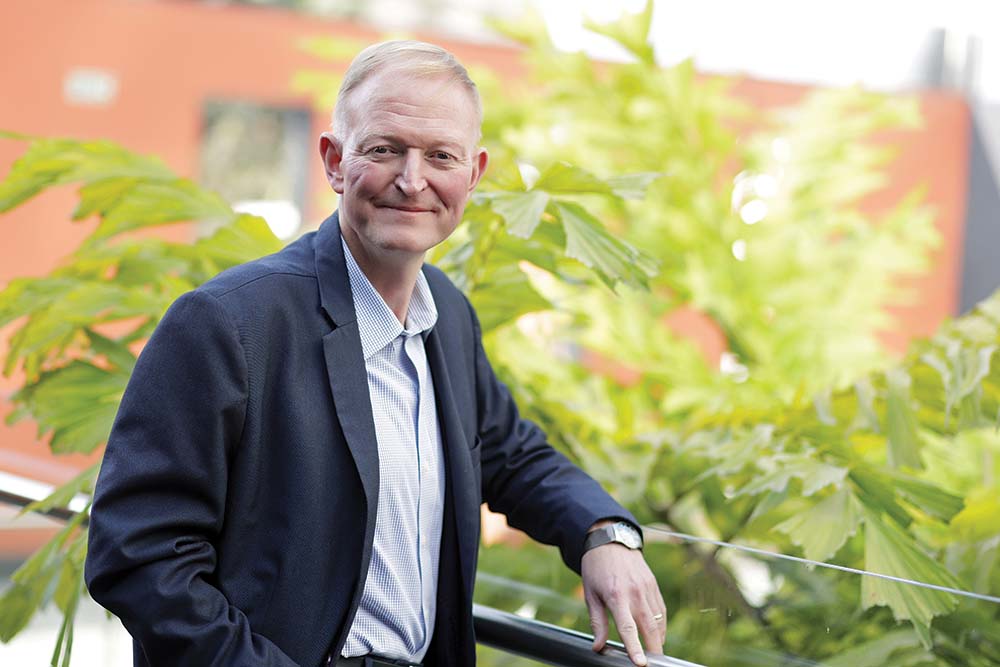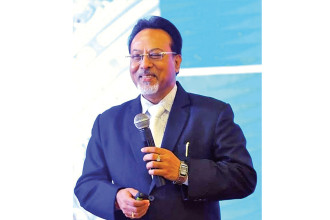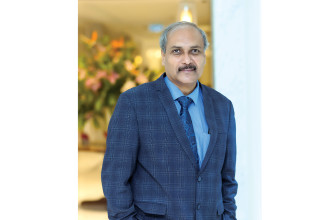
It is my deep conviction that when people at the local level are given the opportunity to decide on their own affairs and when the local administration is more professional and effective then it is not only good for the country but the entire region. The moment we have more people participating at the grassroots level on decisions that are directly concerning them, it fosters democracy
Dr Carsten Klein, Head of the Regional Office South Asia of Friedrich Naumann Foundation for Freedom, who is based in New Delhi, was in Kathmandu recently. During his stay, Business 360 had the opportunity to meet Dr Klein and speak to him about various aspects of governance, development, markets, and his work experiences. Though the FNF does not have any representative office in Nepal, it is involved in various activities in the country through its Nepali partner Samriddhi Foundation. Dr Klein, who has been a liberal throughout his life, has also served in the Bundestag, the German federal parliament, as an advisor for foreign and security policies. It is through his experience as an elected representative of the parliament that Dr Klein says he has derived his deep understanding and sympathy for municipal affairs. Dr Klein has additionally spent nearly 20 years as the Managing Director of two regional parliaments of the federal states of Saxony-Anhalt and Thuringia. He says that his greatest joy and interest in the democratisation process of Nepal is the emphasis being laid on the municipalities in the recent federal structure of governance that the country has adopted. Excerpts of an interview with Dr Klein:
What was the first impression when you came to Nepal?
The first thing that struck me during my stay, even though it is a short one, is the spirit of the society, of the people to be precise. I could literally feel the energy among the people and it is not the normal type of spirit. The people here are free thinking, inspiring, and also aspiring to learn and experience new things which is amazing. I know there are still many challenges that the people have to face but with all the positivity that I have witnessed it is not a question of ‘if’ but only ‘when’ people will be able to overcome those hurdles. The other aspect that I liked is the emphasis being laid on the local level governments because I believe that without the involvement of people at the grassroot level we cannot have a properly functioning democracy. It is my deep conviction that when people at the local level are given the opportunity to decide on their own affairs and when the local administration is more professional and effective then it is not only good for the country but the entire region. The moment we have more people participating at the grassroots level on decisions that are directly concerning them, it fosters democracy. I am only speaking through the several years of experience that I have gathered and from observing things in other countries. So, yes this importance being given to municipalities in Nepal I would say is a very good first step for many better things to come.
With your vast experience in the German Bundestag how would you suggest the country move ahead with the federal structure of governance in Nepal?
I must be honest when I say that I haven’t had the opportunity to dive deep into the administration structure of Nepal, especially the municipalities. However, professionalism and trained skills are very important at that level and it is for all concerned authorities like the mayors and other elected representatives. They should all know what their roles exactly are. Even the civil servants working at that level must be adept because they are the ones who are in permanent contact with the people. They should all be trained in a professional and sophisticated style. As a representative of FNF, I would like to foster that aspect so that we can have a more positive impact on good governance. What I would like to suggest the people is that they should be aware of their rights. They should be informed about what the administration has to do for them and also the things it cannot do. We must realise that we can’t always expect everything from the state. Having said that, I would like to stress that the lower-level administration should always be able and motivated to help the people by building schools, infrastructure and health facilities. The civil servants must always try to obtain new skills so that they are able to serve people in a better manner. It would be great if we could work on the concept of town halls where people could be invited for meetings. People need to be inspired to attend such meetings and be involved in the political system as it is their system. They should know and feel they are a part of the system. Personally, I would want to see the first roots of the federal structure in Nepal grow in that direction as it is very important for a good democratic process.
What is the way forward for a sustained development process?
I am not the government and not in a position to advise but what is clear to see is Nepal is a country of tremendous potential. One really big potential is nature, which can be viewed in different perspectives. From the mountains to the terai and the jungles and rivers, Nepal has so much to offer hence an eco-related clever tourism would be a very good first step. However, you need a trained professional tourism structure. And of course, since tourism means getting people from Point A to Point B you also need good means of transport. Building a decent infrastructure like roads I would say is the need of the hour to enable the movement of tourists, to give them a chance to travel and see the various natural landscapes that the country has. There are many natural and historical sites in Nepal but travellers must have access to them. What you also need to understand is when I talk about tourism I am not focusing on quantity alone but quality too. Also, I am not talking about extremely rich tourists only but of those who would like to explore the natural resources of Nepal. I know Nepal is doing a lot to protect its nature and resources, which is laudable because at the end of the day tourism is all about people feeling good. When tourists come here, they should come with a belief and understanding that they are not visiting just any other country but Nepal, where there is so much to learn from the people. Like I mentioned earlier, nature can be viewed in different ways and by this I mean you also have plenty of sun and water. These are natural resources found in abundance that are sources for renewable energy but that demands investment and expertise. At the moment the entire world is in discussion regarding how to preserve the environment and the core aim of the Sustainable Development Goals (SDGs) is to maintain and protect the environment and how natural resources can be utilised in a clever way. So, this is one area that could be further developed for sustained progress. And it would be great if not only the Nepali government but the development partners too put more emphasis on harnessing these natural resources.
Is there any particular area that the German government could and will provide assistance to Nepal?
We now have a new parliament and a newly elected government in Germany and I can only say that Asia in general and South Asia in particular is the focus in the coalition. The region has become a central area of interest and mentioned in several places in the coalition contract. I am not the government but what I could suggest is we should try to enable people to meet at an individual level. There is a very strong Nepali society in Germany which has been taking a lot of initiatives. The society has been enabling students, academia, media and researchers to interact with each other. My advice to the new German government and also my personal wish is to nosedive into the Nepali society in a more intensive manner, and see and learn on what could be done at different levels of interest for people to meet and interact. As a liberal, I would say it is important to have parliamentarians and stakeholders together and also the common people like school or university partnerships. It is important because Nepal may be defined as a small nation but in the European context it is a big country. The population here is 30 million which is about the size of Switzerland and Austria put together. With the enormous growth and vision that people have here I feel they must be supported at an individual level, especially the economic efforts that people undertake. Through our partner, Samriddhi Foundation, we have got to know there are many people who are doing very nice things to earn a livelihood, especially women. I have seen many women who are willing to contribute something to the family budget and they invest a lot of personal energy to do something. As a foundation we have been supporting many small and medium scale entrepreneurs and now we could look at the digital marketplace. If these entrepreneurs can interact and present their products on the internet then they will be able to reach out to more international customers.
While framing policies related to a country like Nepal, does Germany look at the country individually or in tandem with the region?
Well, to a certain extent Nepal is seen within its neighbourhood. I mean you can never change the geographical situation of the country. I think at the multilateral level like in the United Nations or during interactions between Nepal and the European Union, there might be some very good ideas coming from the Nepali side. So, this requires the other side to look into what particularly is Nepal doing. Due to the geography like I mentioned earlier it is like being in a room with two big elephants, hence there is always a compromise of sorts. However, there are still many things to be done in Nepal and I feel more interaction at the multilateral level is the need of the hour. [gallery link="file" columns="1" size="full" ids="18669"]
People have a lot of energy in Nepal. The only thing I wish is for more younger people and students to strive to do their own business. I did meet some people on the streets and was fascinated that many of them have jobs but are also doing their own business.
There are many platforms and forums where discussions related to free movement of goods are held. What are your thoughts on free movement of labour?
I am not in a position to assess and give advice to the individual governmental partners and stakeholders regarding this issue. But you see I could only say we come from a bad historical situation during World War II where Germany especially and our grandfathers, some of them at least, did a very bad thing. However, that chapter is closed now and it was possible due to European integration. And when we talk about integration it basically means people are allowed to travel and meet each other freely. At the foundation we always do all of our initiatives on a pan South Asia level. We invite stakeholders and interesting actors of the concerned field whether it be education or good governance to bring in their perspective which necessarily does not have to be the same as that of the neighbouring countries. So, I could only recommend that one mission for the region should be to open more spaces especially for individuals to interact and learn from each other. When people meet, we are actually bridging the frontiers. There are so many families whose members are scattered across the world so we should make it easy for them to meet each other. I think that is the only way to raise a common understanding and to avoid potential further conflict.
The GIZ, which has been active in Nepal since 1974 and is a crucial development partner, is gradually phasing out its operations. How do you view this?
I am very sad that the GIZ is phasing out its operations in Nepal. The decision to do so was taken by the development ministry of Germany. I highly criticised that from my personal point of view. Looking at the country and realising how essential the GIZ is in the region I would really like to have this extremely interesting and relevant work to be continued. I have had the opportunity to see some of the projects that GIZ has been doing here and it has been doing a lot in the field of federalism, good governance and fostering good relations and economic issues. Looking at all that work I feel it would be good if these valuable works could be continued. I must add that these works are not related to big organisations but at the grassroots level and people at this level are the core of everything. We must give them a chance to see and learn from each other. It is important for everyone to understand that joint learning is what is needed. Even a language centre like Goethe-Zentrum has a vital role to play because when people come to learn the language there is also an exchange of culture. There is an exchange of ideas. When people start interacting and sharing ideas it also lessens the friction that could have existed between them.
What economic model would you consider best for Nepal to adopt?
Like I mentioned earlier, people have a lot of energy in Nepal. The only thing I wish is for more younger people and students to strive to do their own business. I did meet some people on the streets and was fascinated that many of them have jobs but are also doing their own business. It may be small but I saw many had their own businesses and that is always an encouraging thing to see. I think it is always good to set a framework for a liberal market policy, both within the country and the greater region. In Germany too we have a lot of exchange of goods and services with our neighbouring countries. It is another good way of bringing people together. The best model for a good economy I believe is the free market economy.
READ ALSO:
- Samriddhi Foundation launches Legislation Repository, website for Nepali entrepreneurs
- It is better to do a little than to do nothing






